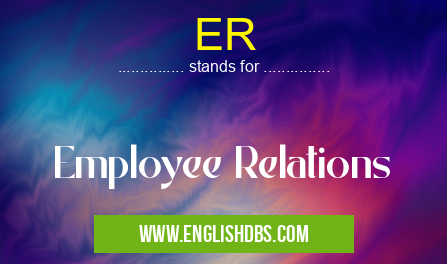What does ER mean in EMPLOYMENT
ER is an abbreviation commonly used in various contexts, particularly in the governmental and business sectors. It stands for Employee Relations. ER plays a crucial role in fostering a positive work environment and addressing employee concerns to promote employee satisfaction and productivity.

ER meaning in Employment in Governmental
ER mostly used in an acronym Employment in Category Governmental that means Employee Relations
Shorthand: ER,
Full Form: Employee Relations
For more information of "Employee Relations", see the section below.
ER Meaning in GOVERNMENTAL
In the context of government, ER specifically refers to the Employee Relations Office (ERO). The ERO is responsible for managing employee relations within government agencies and departments. It handles a wide range of responsibilities, including:
- Employee Advocacy: Representing employees' interests and advocating for their rights.
- Grievance Resolution: Addressing employee grievances, investigating complaints, and facilitating conflict resolution.
- Labor Relations: Negotiating collective bargaining agreements with employee unions.
- Employee Training and Development: Providing training opportunities and supporting employee professional growth.
- Employee Benefits and Compensation: Administering employee benefits programs and ensuring fair compensation practices.
ER Full Form
The full form of ER is Employee Relations. It encompasses all aspects of addressing employee concerns, fostering workplace harmony, and maintaining a productive work environment. ER professionals work closely with management and employees to create a positive and supportive workplace culture.
What does ER Stand for?
ER stands for Employee Relations. It represents the field dedicated to managing the relationship between employers and employees, ensuring a healthy work environment, and promoting employee well-being and satisfaction.
Essential Questions and Answers on Employee Relations in "GOVERNMENTAL»EMPLOYMENT"
What is the role of the ER department?
The ER department is responsible for maintaining positive employee relations within an organization. They handle employee concerns, disputes, and other HR-related issues.
What are the typical responsibilities of an ER specialist?
ER specialists typically handle the following responsibilities:
- Responding to employee inquiries and resolving complaints
- Conducting investigations and disciplinary actions
- Developing and implementing ER policies and procedures
- Providing training and support to employees on ER-related matters
How can the ER department contribute to employee morale?
The ER department can contribute to employee morale by:
- Creating a fair and equitable workplace
- Resolving employee concerns promptly and professionally
- Providing opportunities for employee growth and development
- Promoting a positive work environment
What are some common challenges faced by the ER department?
Common challenges faced by the ER department include:
- Balancing the needs of employees with the needs of the organization
- Dealing with difficult employees
- Staying up-to-date on employment laws and regulations
How can employees benefit from utilizing the ER department?
Employees can benefit from utilizing the ER department by:
- Getting support and guidance on workplace issues
- Resolving conflicts and disputes
- Learning about their rights and responsibilities
- Developing their professional skills
Final Words: ER is an abbreviation that holds significant importance in the governmental and business sectors. It represents the vital role of Employee Relations in maintaining a positive work environment, resolving employee concerns, and fostering employee satisfaction and productivity. By effectively managing employee relations, organizations can create a workplace culture that values employees, promotes collaboration, and ultimately enhances organizational success.
ER also stands for: |
|
| All stands for ER |
